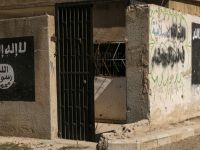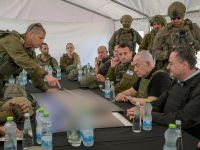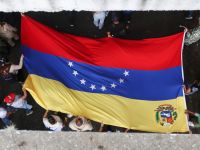When Kuwait stages its 10-year celebration of the victory over Saddam Husain this month, most of the original cast will be on hand.
Saddam Husain himself, of course, never left; but most of the American team that led the Gulf War coalition, having taken a breather for eight years, is now back in Washington preparing for the revival.
Vice-President Dick Cheney, Secretary of State Colin Powell and their prospective deputies were all key players in 1991.
Defense Secretary Donald Rumsfeld was not, but as a special US envoy to the Middle East in the mid-1980s he may be the only senior US official to have sat down in a face-to-face meeting with Saddam.
President Bush himself was an understudy to his father during those momentous days, while some of the original cast members such as James Baker and Brent Scowcroft are now prompters and stagehands.
Saddam is on their minds.
The Iraqi dictator, the Energizer bunny of Middle East politics, recently presided over a massive military parade of a thousand tanks, smiling and firing his rifle in the air to cheering throngs.
He may have rebuilt his factories for biological and chemical weapons. His odious son 'Uday, limping from the wounds of an assassination attempt, has lately renewed the suggestion that the ‘province’ of Kuwait should be included on Iraqi maps.
Twice in recent months Saddam Husain has moved military forces toward the Syrian-Jordanian border as a token of his willingness to intervene militarily in support of the Palestinian intifada, and his agents have been going house to house on the West Bank delivering checks to those who lost family members in confrontations with Israeli forces.
His picture is displayed everywhere in the Arab street as he taunts other Arab leaders less eager to wage war against Israel.
The UN sanctions are badly frayed. Baghdad’s airport is open and delegations from around the world arrive daily.
Iraq has signed free trade agreements with Egypt and Syria and has reopened a pipeline to Syria that was closed in 1982 following Iraq’s invasion of Iran.
The oil smuggling trade through Turkey and the Gulf earn Saddam and his coterie millions of dollars a day in non-accountable revenue.
Iraq is authorized to sell all the oil it can produce, with proceeds controlled by the UN, but even with UN subtractions for expenses and war claims, Iraq has been accumulating more money than it is willing to spend on food and medicine, putting the lie to its claims that the hardships of the long-suffering Iraqi people are due exclusively to the sanctions.
George Bush the elder is scheduled to be in Kuwait for the 10th anniversary celebrations, perhaps with Colin Powell.
The last time George Bush was in Kuwait, Saddam sent a team of agents to try to assassinate him, prompting a missile strike by the Clinton administration on Iraqi intelligence headquarters.
In his current mood of triumphal belligerence, the Kuwaiti celebration will provide Saddam Husain a tempting occasion to strike a pose for a worldwide audience. The deeds of the father may soon be visited on the son.
Bush and his lieutenants have denounced the ‘amateurish, do-nothing’ policy of the Clinton administration. The criticism is justified.
Clinton’s get-tough policy peaked in 1998 with the Desert Fox bombing campaign, which left Saddam unscathed and the UN arms inspectors gone – perhaps for good.
At that point, with world opinion becoming increasingly concerned about the fate of the Iraqi people under sanctions, Clinton ran out of ideas and essentially sat on his hands for two years.
‘Regime change’ was the declared objective of US policy, but Saddam is still there thumbing his nose at the world.
Criticism of the Clinton policies is easy – as easy as criticizing George Bush père for leaving Saddam in place at the end of Desert Storm by authorizing his use of helicopters and heavy weapons to put down popular rebellions in the north and south. That was a moral failure as well as a policy failure.
The harder question is what to do now. Sanctions failed. They met their match in Saddam Husain, who was willing to subject his population to immense suffering in order to extort concessions from the international community.
All that remains is UN control over Iraq’s oil sales and purchases of humanitarian goods – an important tool but insufficient to force a change.
Saddam’s conventional military capabilities have been eroded but not eliminated, and concerns about his ability to produce chemical and biological weapons cannot be dismissed.
This is a leader who invaded two of his neighbors in the space of one decade, and no one doubts that, given the least opportunity, he would soon be back to his old tricks.
The options are not promising. The most benign proposal is to lift all sanctions except for military purchases, prepare a war crimes tribunal against Saddam and his cronies, and try to reinvigorate the Iraqi economy in the hopes that domestic pressures on Saddam Husain will grow.
That is a sustainable long-term strategy that would attract widespread international support, but it is hard to reinvigorate a command economy that is under the absolute control of one man.
A second possibility is to re-energize the sanctions regime, as Colin Powell has proposed, while maintaining a strict deterrence posture toward any threatening actions from Baghdad.
Unless Powell has discovered some new sanctions that have not occurred to any of his predecessors, this is likely to be a Clinton re-run, perhaps bolstered by more vigorous support of the exiled opposition forces.
Some in the Bush team favor a roll back strategy under-girded by a new anti-Saddam coalition.
They want to recognize the Iraqi opposition as a government in exile, set it up in an enclave within or adjacent to Iraq, and provide it with arms and air cover to challenge the Baghdad regime.
The recent approval of US funding for the Iraqi opposition to begin working inside Iraq, though largely symbolic, is consistent with such a plan. However, this kind of high-risk, open-ended scheme is feasible only with staunch support by US forces.
It was derided by the former US military commander in the region as a ‘Bay of Goats’ strategy, and it could prompt an early rift between the Defense Department hawks and Colin Powell’s diplomatic team at State.
Some of these elements might be combined in a long-term strategy, especially if backed by a renewed coalition of Iraq’s regional neighbors.
The new administration has some advantages in trying to fashion such a coalition. The Arab states believe that a Bush administration will not be as tightly allied with Israel as was the Clinton administration.
That makes Washington a more attractive partner and may buy time to develop a concerted strategy.
It will not be a quick fix, however, and it will disappoint hawks and doves alike. Moreover, it is unlikely that Saddam Husain will sit still while this kind of patient coalition building is going on.
He is much more likely to test the new administration early, before they have worked out a policy consensus among themselves.
Some in Washington may relish the prospect of an armed confrontation to bolster their tough-guy image, but the re-run, if it comes, will severely test the cohesion of the new team in Washington and will provide an early glimpse of how Bush and Co will deal with messy and persistent foreign policy dilemmas.
Saddam, of course, will lose militarily, but he is the all-time master of fabricating symbolic victories out of utter defeat.
Demonstration of his willingness to stand up to the world’s sole superpower may be sufficient for his own ego and for his carefully cultivated image as the only fearless and authentic leader of the Arab world. Plus ca change.
by Gary Sick - Gary Sick, who wrote this article specially for MEES, is Senior Research Scholar at Columbia University and Executive Director of the Gulf/2000 project.
Mr. Sick was a member of the US National Security Council in the White House with special responsibility for Iran and the Gulf during the Iranian revolution and the hostage crisis.
(mees)
© 2001 Mena Report (www.menareport.com)







